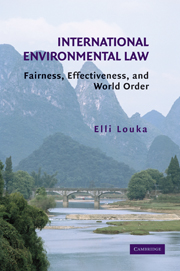Book contents
- Frontmatter
- Contents
- Foreword by W. Michael Reisman
- Abbreviations
- Introduction
- Chapter 1 Introduction to International Environmental Law
- Chapter 2 Foundations of International Environmental Law
- Chapter 3 Compliance and Governance Mechanisms
- Chapter 4 Marine Environment
- Chapter 5 Water Resources
- Chapter 6 Fisheries Resources
- Chapter 7 Biodiversity
- Chapter 8 Air Pollution
- Chapter 9 Trade and Environment
- Chapter 10 Hazardous and Radioactive Wastes
- Chapter 11 Liability and State Responsibility
- International Treaties and Other Instruments
- List of Cases
- Index
Chapter 2 - Foundations of International Environmental Law
Published online by Cambridge University Press: 14 January 2010
- Frontmatter
- Contents
- Foreword by W. Michael Reisman
- Abbreviations
- Introduction
- Chapter 1 Introduction to International Environmental Law
- Chapter 2 Foundations of International Environmental Law
- Chapter 3 Compliance and Governance Mechanisms
- Chapter 4 Marine Environment
- Chapter 5 Water Resources
- Chapter 6 Fisheries Resources
- Chapter 7 Biodiversity
- Chapter 8 Air Pollution
- Chapter 9 Trade and Environment
- Chapter 10 Hazardous and Radioactive Wastes
- Chapter 11 Liability and State Responsibility
- International Treaties and Other Instruments
- List of Cases
- Index
Summary
FUNCTIONS OF LAW
Status Quo and Change
Institutions provide the rules of the game in a society. These are the rules concocted by humans to assist them in their cohabitation. Law is an institution. One of the goals of law is to establish rules that would increase the predictability and certainty of outcomes and, thus, facilitate transactions in a society. As an economist would put it, the purpose of law is to reduce the transaction costs of cooperation among individuals or other legal entities, such as corporations and states. Transaction costs include the costs of defining and enforcing property rights and the costs of remedying the information asymmetries among parties about to enter a transaction. A vast amount of society's resources is devoted to monitoring and enforcing behavior to ensure conformity with the rules of law.
The purpose of international law is to facilitate state interaction by introducing order where, otherwise, would be disorder, anarchy, and war. The primary goal of the United Nations is to safeguard peace, a precondition for cooperative outcomes. Various international organizations and treaties have been adopted with the purpose of coordinating state interaction by standardizing expected behavior.
The pursuit of order and stability perpetuates a view of a law as an institution of the status quo. To give an example, the principle of stare decisis is explicitly endorsed in Anglo-Saxon systems but also is implicitly adhered to in civil law systems.
- Type
- Chapter
- Information
- International Environmental LawFairness, Effectiveness, and World Order, pp. 59 - 113Publisher: Cambridge University PressPrint publication year: 2006
- 1
- Cited by



